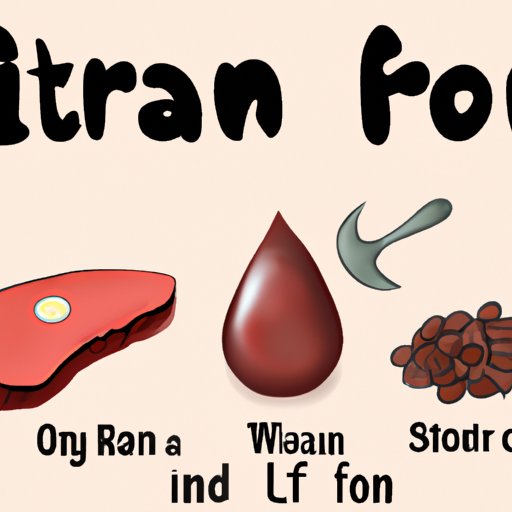
I. Introduction
Iron is a vital mineral that plays a crucial role in the body’s oxygenation process. Low iron levels can cause a range of symptoms that can be frustrating and even debilitating. It is essential to recognize the signs of low iron and seek proper treatment to alleviate these symptoms and improve your overall health. This article explores how to know if you have low iron and provides advice on testing and solutions.
II. Symptoms to Look Out For
The most common symptoms of low iron levels include fatigue, weakness, dizziness, pale skin, brittle nails, and hair loss. If you experience these symptoms, it’s important to get tested for low iron. It’s important to note that these symptoms can be related to other health conditions, so it’s crucial to see a doctor to get tested.
III. Getting Tested
To determine if you have low iron levels, your doctor will perform a blood test. The blood test will measure your hemoglobin and ferritin levels, giving your doctor an accurate picture of your iron levels. If your levels are low, your doctor may recommend additional tests to determine the underlying causes and rule out other health conditions.
IV. Dietary Solutions
The most effective way to increase your iron levels is by eating iron-rich foods. The best sources of iron include red meat, poultry, fish, beans, lentils, tofu, leafy greens, and fortified cereals. It’s important to eat a well-balanced diet that combines iron-rich foods with sources of vitamin C, such as oranges, tomatoes, broccoli, and bell peppers, to improve iron absorption.
V. Iron Supplements
If you have difficulty getting enough iron from your diet, your doctor may recommend iron supplements. Iron supplements are available in different forms, such as tablets, capsules, and liquids. It’s important to follow your doctor’s instructions carefully when taking iron supplements. Iron supplements can cause digestive upset and constipation, so it’s crucial to choose the right supplement for your needs and pay attention to any side effects.
VI. Lifestyle Changes
Making lifestyle changes can also help improve iron absorption. Reducing caffeine and alcohol intake can help improve iron levels, as can quitting smoking. Smoking can affect iron absorption negatively and cause additional health problems. It’s important to discuss any lifestyle changes with your doctor before implementing them.
VII. Seeking Medical Advice
If you suspect you have low iron levels, it’s essential to seek medical advice. A medical professional can help you address the issue and rule out other potential causes of low iron, such as internal bleeding. It’s crucial to get a proper diagnosis so that you can begin the proper treatment and improve your overall health.
VIII. Conclusion
Low iron levels can cause a range of symptoms that can affect your daily life and overall well-being. Recognizing the signs of low iron is the first step in identifying the issue and finding solutions. Whether through dietary changes, iron supplements, or lifestyle modifications, it is possible to improve your iron levels and reduce the symptoms of low iron. Make sure to seek the advice of a medical professional to get properly diagnosed and treated.





